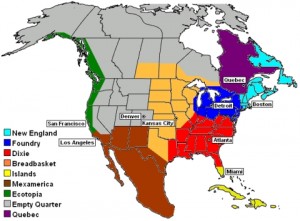Joel Garreau, The Nine Nations of North America (Avon Books, 1989)
Review: The Nine Nations of North America
5 Star, Atlases & State of the World, Complexity & Catastrophe, Country/Regional, Democracy, Future, Geography & Mapping, Nature, Diet, Memetics, Design, Secession & Nullification  Merits Reprinting and Slight Updating, March 20, 2008
Merits Reprinting and Slight Updating, March 20, 2008
Joel Garreau
I thought I had reviewed this long ago, but evidently not. It is still very relevant to understanding and nurturing America today, and I would be very glad to see the publisher commission a slight update and then reprint this superb work.
As America strives to migrate from a disasterous and nearly fatal two-party spoils system and an Executive that is both corrupt and delusional, those who seek to lead America into a brighter future need to understand America in a new and more nuanced way. It is not about left or right. This book has been on continuing value to me as a point of reference, and I recommend it very highly in its existing state, more so if renewed.
The nine nations, each unique, are:
1. The empty quarter (which global warming will open up)
2. Quebec
3. Ecotopia (a model for the rest of us)
4. The breadbasket (which wastes water on excess foot and grows corn for fuel and cattle that is inedible and wastes more water)
5. New England
6. The Foundry (mid-Atlantic coast)
7. Dixie
8. MexAmerica
9. The Islands (of the Caribbean, where Cuban sugar cane sap could power 30-35 million cars, while Cuban health care would inform our own).
This book is one of my top eleven essential references for understanding America and the Americas. Here are the other ten:
The American Mind: An Interpretation of American Thought and Character Since the 1880's
What Kind of Nation: Thomas Jefferson, John Marshall, and the Epic Struggle to Create a United States
The Clustering of America
Losing America: Confronting a Reckless and Arrogant Presidency
The Cultural Creatives: How 50 Million People Are Changing the World
The Tao of Democracy: Using Co-Intelligence to Create a World That Works for All
Imagine: What America Could Be in the 21st Century
The Wealth of Networks: How Social Production Transforms Markets and Freedom
Revolutionary Wealth: How it will be created and how it will change our lives
Collective Intelligence: Creating a Prosperous World at Peace

Review: Radical Evolution–The Promise and Peril of Enhancing Our Minds, Our Bodies — and What It Means to Be Human (Hardcover)
4 Star, Future, Information Society, Information Technology, Science & Politics of ScienceHe focused on four technologies abbeviated as GRIN: Genetics, Robotics, Information, and Nano. Others have focused on the integration of Nano, Information, Bio-Technology and Cognitive Science (NIBC), and I would have been happier with this book if it focused more on the thinking side of the future rather than the bio-mechanical side.
The other area where I felt the book was disappointing was in its almost total acceptance at face value of all that the Defense Advanced Research Projects Agency (DARPA) is doing to elevate soldier-humans, giving them super human strength, acute mental perception almost to the point of telepathy, and so on. I could not help but feel, over and over as I read this book, that if DARPA were to apply its considerable talents to waging peace and addressing poverty, disease, water scarcity, energy independence, and the urgent need for global education that does not require packing kids like rats into a stiffling anti-creative environment (and making them get up at 0600), that we would all be better off.
The author talks about the implications for human transformation in all of this, but missing from his schema is the moral dimension. This is closer to a comic book super-hero depiction than it is to a renaissance man's moral and cultural enlightenment, and that, in my view, is where this book falls short–it lacks soul.
I recommend that readers consider the books by Tom Atlee, The Tao of Democracy: Using Co-Intelligence to Create a World That Works for All and Margaret Wheatley Leadership and the New Science: Discovering Order in a Chaotic World as well as the book The World Cafe: Shaping Our Futures Through Conversations That Matter to gain an alternative perspective on what it might mean to be human in the future, despite the over-whelming incursions of technology into our humanity.



